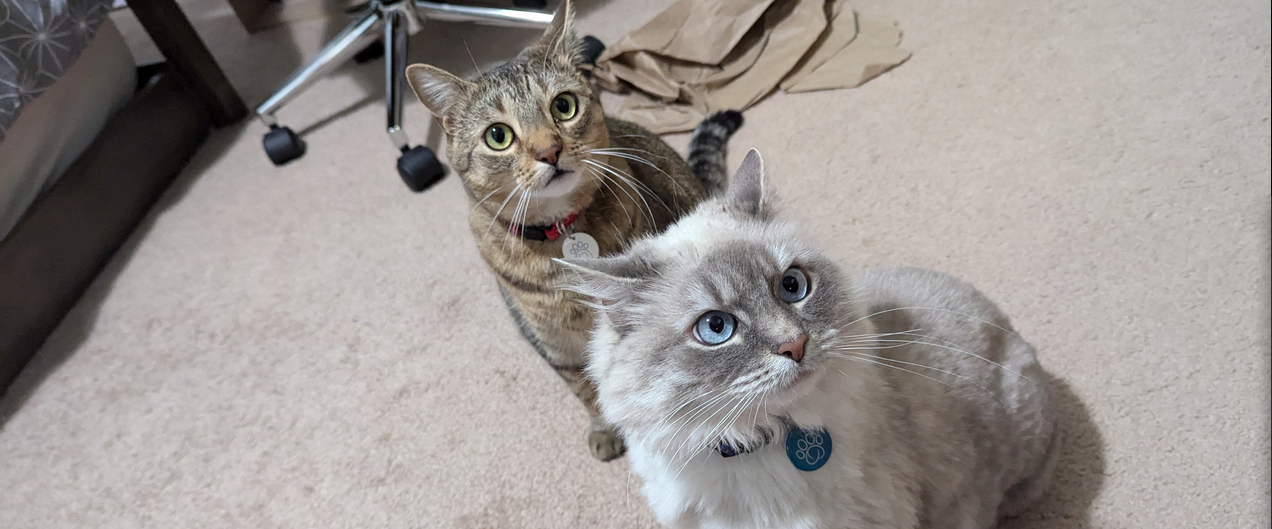5 Things: "Hello, World" Edition
A few things I read this week and found interesting?

Here's a new thing I want to try out. I read a lot of stuff every day. And some of them stick with me. Some I'll share on Bluesky, some I'll write full blog posts about.
But many fall somewhere in between. Something I read that makes me think, and I have more than 300-600 characters to say about it for a short Bluesky thread, but less than 6,000 characters for a full-on blog post.
I thought it might be fun to pick a few things each week or two and put them together into a single post with some brief(-for-me) thoughts.
So let's give it a shot. I don't know how obvious the styling is going to make it, but the section headers are links to the articles I'm talking about.
A note before we begin: Don't expect a whole bunch of general US current news in these. While I of course read tons of that and Have Opinions, I am choosing to leave that kind of stuff to the experts like Talking Points Memo, The Atlantic, and 404 Media.
I may pull stories from outlets that do talk about these things alongside topics I'm more informed about - such as Wired, Techdirt, and tons of independent bloggers that are doing great work at the intersection of tech and democracy - but I'm mostly going to be sticking close to my wheelhouse so I don't inadvertently create or spread misinformation.
Mike Masnick's new Section 230 Podcast: Otherwise Objectionable
As a teenage Slashdotter in the early 2000s, Section 230 was something that was very important to me. But eventually it just became part of the DNA of the Internet. Or, specifically the American part of the Internet, but that itself has massive ramifications for the global Internet.
In 2016, "something" changed (3 guesses), and it has only accelerated since then. Everyone hates what Big Tech has done to the Internet for different reasons and are looking for a quick fix. And what they find is this Section 230 thing that sort of underpins everything. And that quick fix starts to look like tweaking or repealing it. Which threatens not only to inadvertently further embolden Big Tech platforms to harm society, but to destroy the independent Internet along with it.
I recently wrote a post about this after an absurd outburst from a US Senator. But Mike Masnick of Techdirt has literal decades of expertise and reporting on the intersection of tech and law, including Section 230.
Well he's also recently started a new podcast, called Otherwise Objectionable, to explain and explore this important topic. This first episode is a good listen whether you are new to this topic or not.
It's All J.J. Abrams' Fault! (Not Really.)
If you're like me, you enjoy a good "how the fuck did we get to this moment in society" post. Not that there is a single answer or provable directional causality. But it's interesting to think about how different modes of thinking and operating move through different parts of society in different ways.
This post from author Charlie Jane Anders (of, among other excellent books, All the Birds in the Sky and The City in the Middle of the Night) draws parallels between our current societal and political climates and the "mystery box" style of storytelling most associated with JJ Abrams and TV shows like Lost.
She discusses how this sort of media can keep audiences hooked by always answering a question with another question and by keeping certain aspects of the narrative vague or hidden to force the audience to fill in the blanks. These rabbit holes can offer compelling storytelling, until you need to wrap up the story in a satisfying manner. But the way US TV works, the show just runs until people have stopped watching so it doesn't matter how it ends.
She draws parallels to the proliferation of media personalities who are "Just Asking Questions" with no real appetite to learn the objective truth despite it being more easily-accessible than ever. To people who look to institutions and sectors of society in which they have no expertise and see only clues to a deep conspiracy rather than wondering if there's a reason that things run the way they do. To the way "we are now being governed by people who want to dig rabbit holes that lead nowhere."
Anyway, it's an interesting read that examines this specific quirk of human natures from a couple of different angles. And, like all of these articles, is in its own way quietly terrifying.
To Kill a Dragon: Video Games and Addiction
A moderately-lengthy but very compelling read from Joey Schutz, game designer and game design professor. As the name suggests, it's on the topic of video games and addiction.
With a piece like that, you'd usually be in for a quick "loot boxes bad" and maybe a "free to play, more like pay to win" kind of thing. But this takes a very deep view of parallels between video gaming and casino gaming through the lens of both Joey's own experience and expertise in game design coupled with insights into casino gaming addition from the book Addiction By Design by Natasha Dow Schüll.
Going far beyond simple discussions of casino gaming-like mechanics in video games, it discusses how all aspects of game design can influence the same human systems that drive addiction in casino machine games and beyond.
Specifically, it discusses ways in which game design can serve to weaponize flow state and how these types of addictions in many people can be thought of as the pursuit of oblivion through flow state. Pun noted but not originally intended.
It discusses the application of addictive qualities even to games that aren't even looking to steal your money. How discussions of level design can boil down to how smoothly and efficiently they usher the player from reward to reward rather than...well any other aspect of level design - technical, artistic, or otherwise.
I don't play a lot of modern games, so I find myself disconnected from that zeitgeist in a lot of ways. But I recently played through Avowed when it came out. I found a lot of people had the same question: "What happens after I beat it?" Many people were disappointed that they couldn't keep exploring the world forever after they completed the story or couldn't immediately roll into a new game plus. This struck me as odd because, well, you've just finished a game that will have taken you something like 50-60 hours for a moderately complete playthrough - maybe a lot longer for 100%ing it. Maybe go do something else for a bit?
And I'm sure "I just spent $70 on this, I'm getting my money's worth" is part of it, but it's interesting to wonder how many gamers are conditioned to just need to Keep Playing Forever and they get upset when they can't.
How decentralized is bluesky really? (and its sequel)
These are two quite lengthy and technical blog posts from Christine Lemmer-Webber, co-author of the ActivityPub protocol that powers the Fediverse. So you know you're in for some in-depth and well-informed thoughts on protocol design, and especially protocols for distributed/decentralized systems.
As someone who has been on-and-off with the Fediverse since 2017, I had always heard that "Bluesky is decentralized-but-not-quite" with various positive, negative, and neutral connotations. And since I started actually using Bluesky a few months ago it was nice to be able to attach some actual detail to those remarks. I had heard of Personal Data Stores for Bluesky, but I wasn't clear on how exactly those hooked into the rest of the system nor what other parts of the system actually existed to hook into.
In the end, I learned that Bluesky is less decentralized than I expected, but that I'm more okay with that than I expected. Maybe it's just because I'm still a little burned out from the constant interpersonal drama between fediverse developers on relatively minute technical details. But a couple things stand out to me:
When Bluesky first blew up, I had heard rumblings that they had a path to solving the decentralized identity problem that has plagued the Fediverse since time immemorial. That is, I can (now) migrate between two Mastodon servers and take my data with me, but I can't just "log in" to a new server using my existing identity. It's interesting to learn that it isn't quite the case for Bluesky either or that it requires a pretty specific set of circumstances to be fully trusted.
It was also interesting to learn that Bluesky DMs are not actually decentralized and all flow through Bluesky-the-company. They have a roadmap item to move DMs "on-protocol" but as far as I can tell that has not happened yet. I don't use this feature (and even if I did, I use official Bluesky data stores and relays so same difference), but some folks may be interested to learn this.
Anyway, what I've taken away from this is that I've used Bluesky long enough that I do want to start learning the particulars of its ATproto, where I already have a pretty good understanding of ActivityPub. And I hope people involved in these projects continue to share thoughts, knowledge, and feedback to help them be the best they can be.
“Wait, not like that”: Free and open access in the age of generative AI
The last one this week comes from Molly White of [citation needed] (and one of my favorite websites: Web3 is Going Just Great).
It discusses the reactions people have when they learn that their work which they have released under a free license has been slurped up by an AI company to train their models.
When we freely license our work, we do so in service of those goals: free and open access to knowledge and education. But when trillion dollar companies exploit that openness while giving nothing back, or when our work enables harmful or exploitative uses, it can feel like we've been naïve. The natural response is to try to regain control.
These sorts of reactions are, of course, things that have been happening for years in different ways. In the past, I've mostly seen them in the form of open source projects re-licensing themselves when they learn that, say, Amazon has been making lots of money through offering a service built on that open source project. Perhaps most famously with AWS and Elasticsearch, but this is a pattern played large and small over the years.
Anyway, Molly looks at this issue that a lot of creators of various types are contending with. She discusses the counterintuitive consequences of the natural reaction to redefine "free and open" to mean "free and open [but only for very specific use-cases]" by re-licensing, or paywalling, or CAPTCHA-ing, or any other way you might try to accomplish this.
She discusses how the current situation is unsustainable both from the standpoint of creators of all stripes and from the standpoint of AI companies. The current model is destroying the commons from both ends and everybody eventually loses.
But far from simply surrendering to AI companies, Molly explores way that AI companies could choose to work in harmony with the commons (and vice versa), as they do in some cases with Wikipedia through a Wikimedia Enterprise paid access, to prevent content scrapers from impacting open access for human users. As well as things like strengthening attribution in AI models (which would do good in a number of ways) to point users of those AI tools back to the free and open material that way used to generate the response.
This of course doesn't solve all ethical, moral, legal, and environmental objections to LLMs, but it's an interesting way to think about this specific challenge creators are currently facing.
It'll take some doing to get those tools and frameworks in front of creators - and especially to get AI companies to respect them - but Molly suggests that:
The future of free and open access isn't about saying “wait, not like that” — it’s about saying "yes, like that, but under fair terms”.



![A poorly-drawn cartoon computer with a happy face on the monitor stands next to text: "Don't say tariffs [x4]...oops"](/content/images/size/w600/2025/04/dontsaytariffs.png)
